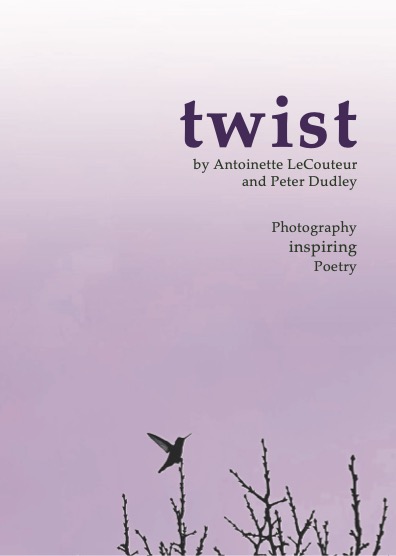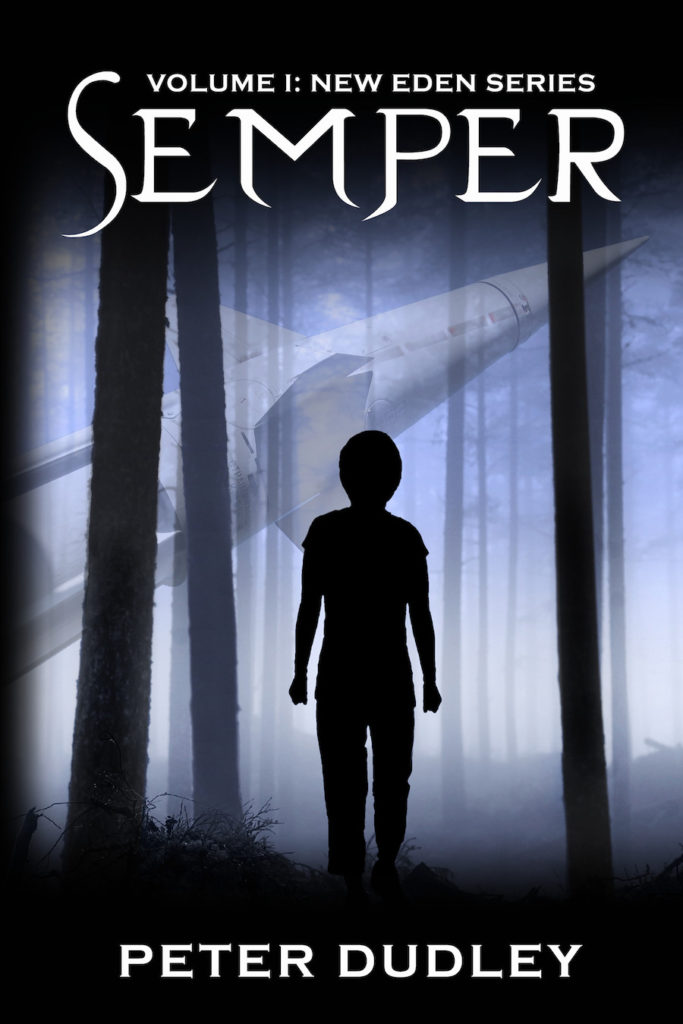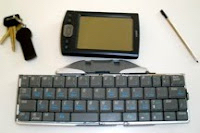This is the last post (for now) on blog.peterdudley.com. Jump on over to graybearcoaching.com for my weekly blog, or graybearpublications.com for book news.
TWIST is available for pre-order
It’s finally here! Well, on April 27th it will be here. But you can purchase it now wherever you buy books. But beware… Amazon has messed up pre-orders in the past, so it’s better to buy direct from the publisher, or through bookshop.org, at your local bookstore, or through Barnes & Noble. I’ve had good experience with all of them.

Draft complete! Book to come out this spring.
A year ago, Antoinette and I completed the first draft of the content that would become together, our first book of photography and poetry.
This morning, we wrote “the end” on the draft of the follow-on book, which we will publish later this spring. We’re still trying out a couple of working titles, so stay tuned.
The first book came together a bit by accident. We didn’t set out to create a book. After New Year’s Day 2022, Antoinette sent me a picture she’d taken while we were on a walk. I wrote a new poem inspired by that picture. Then we did it again the next week, then the next. Over the next several months, this process became a positive, creative, fun touchpoint in a very difficult year. By midyear we thought maybe we could keep it up all year long. By September, we thought maybe we had something that would make a very special book. That’s how together came to be.
This new book is largely the same format and idea as together, with a few tweaks. For example, for 50 of the 52 weeks of 2023, we followed the same process as we did in 2022: Antoinette selected one of her photos from the week, and I wrote an original poem inspired by that photo.
This year, for one of the weeks I was the one who provided the photo, and Antoinette wrote a piece inspired by it. And for another of the weeks, I wrote a poem and Antoinette had to take a picture to go along with it.
You can get a preview of the upcoming book in the 12 months of our 2024 calendar. I’m quite proud of it.
And we’re not done yet! For 2024, we are switching it up a bit. Still doing a weekly creative collaboration, but this time it’s a bit more parallel play. We are taking turns coming up with a prompt word, and then we each have to create something inspired by that word. And we’re not limiting ourselves to photography and poetry this time. The only rule is it has to be printable in a book.
If you want to play along with us, let me know. I can share the prompt words, and you can create your own art along with us.
First public reading of “together”
My latest book, together, is also my first book of poetry.
[ Buy Now: paperback | hardcover | ebook ]
Each week in 2022, my partner, Antoinette, took a picture which I then used as a prompt to write an original poem. The result is a collection of 52 unique, compelling, and intriguing pairings… one from each week of the year.
I designed the book and cover, created my own publishing imprint under my coaching LLC, and published the book through a print-on-demand supplier. I’ve even added some merch!
Last weekend, Antoinette and I participated in a panel of authors and artists, where we read from the book and shared the photographs. We also talked about our collaborative process and how the book came to be—an accident, in a way.
It’s always a vulnerable feeling, sharing your creative output with the world. Going up on stage to read it out loud is a new thing for me.
It was a blast! And the audience members who stayed for the reception after had very nice things to say about it all.
Please get your copy today. The hardcover is way more expensive, but it’s pretty nice. And if you’ve read it, please rate it!

“Dudley’s writing is enthralling.”

I submitted Semper to the Booklife prize this year. Small chance of winning anything (there’s always hope), but every entry received a professional critique.
The short version: This first book in the trilogy is only moderately original, but the writing is “enthralling.” Top marks for character and quality of writing.
Much of the trilogy’s originality grows through the 2nd and 3rd books. But the quality of the writing is consistent.
So if you’re looking for a fun and engaging read in the same genre as Hunger Games and Divergent, give this trilogy a try.
The full review
| Plot/Idea: 7 out of 10 | ⭐️⭐️⭐️⭐️⭐️⭐️⭐️ |
| Originality: 6 out of 10 | ⭐️⭐️⭐️⭐️⭐️⭐️ |
| Prose: 9 out of 10 | ⭐️⭐️⭐️⭐️⭐️⭐️⭐️⭐️⭐️ |
| Character/Execution: 9 out of 10 | ⭐️⭐️⭐️⭐️⭐️⭐️⭐️⭐️⭐️ |
| Overall: 7.75 out of 10 | ⭐️⭐️⭐️⭐️⭐️⭐️⭐️✨ |
Plot/Idea
With a fast-paced, exciting opening, Semper starts on the right foot with multiple kidnappings and tense character interactions from the word go. Events become a tad less exciting when the Hamlet-inspired parts of the plot take over and story beats become predictable.
Prose
Dane’s narration is instantly compelling, bringing us in close to his perspective as the future leader of his people. Expertly balancing internal monologue and action, Dudley’s writing is enthralling. Characters sometimes have more knowledge than feels accurate for three hundred years post-apocalypse.
Originality
Both the Hamlet theme and the post-‘Bomb’ setting are quite common. Neither of the standard tropes of either are subverted much, though they are still written in an entertaining fashion.
Character Development/Execution
Dane, Lupay, Freda, Tom, and others all come across as richly detailed characters with their own unique motivations and personalities. Many traits, especially for the villains, are cribbed from Shakespeare, but it’s all put across so well that it’s hard to mind much.
Cover Reveal – LIFELIKE
I recently redesigned the cover for my book Lifelike. I think the old cover (which was beautifully executed by my cover artist) was poorly directed. This new cover does a better job and, I hope, will generate additional interest in the book. I am convinced the cover was turning people who would have loved the book away from it. What do you think? Drop a comment or email me directly to let me know.


Writing on the go, #NaNoWriMo 2021 day one
Off to a good start for NaNoWriMo 2021. I managed 1,900 words this morning on a new plot line in my growing fantasy series. This is going to be a multiyear project. This will be my 12th attempt at NaNoWriMo since 2005, having “won” five times. My last win was also part of the current series I’m working on.
In 2005, of course, I did not have an iPad, and I can’t remember exactly how I wrote that f irst novel. On a laptop, I suppose. Later, I embraced the minimalist mobile approach. I remember going to write-ins at cafés, setting up my Palm TX and my bluetooth keyboard, and drawing stares and questions from other writers. That bluetooth keyboard folded in half so was not much larger than the Palm. It was also flaky af and required several reconnects to the Palm every hour. But it was great for writing on airplanes, in cafés, and really anywhere I could set the keyboard on my lap and the palm where I could see it. I wrote three novels on that setup.
irst novel. On a laptop, I suppose. Later, I embraced the minimalist mobile approach. I remember going to write-ins at cafés, setting up my Palm TX and my bluetooth keyboard, and drawing stares and questions from other writers. That bluetooth keyboard folded in half so was not much larger than the Palm. It was also flaky af and required several reconnects to the Palm every hour. But it was great for writing on airplanes, in cafés, and really anywhere I could set the keyboard on my lap and the palm where I could see it. I wrote three novels on that setup.
I can only hope that my writing quality has improved as much as technology has in the last 16 years.
Ghost Breath – a short #FictionFriday story
This story originally appeared more than a decade ago on my old blog as part of an online writing group called #FictionFriday. The prompt was “a character gets three wishes,” and this was one of those stories that just flowed from the first line to the last, without me knowing really what was going to happen next. With Halloween approaching, a ghost story seems appropriate to resurrect.
Her mama called it ghost breath, this late September fog that lifted from the nearby pond and swirled slowly around Clara’s ankles and calves. It was thicker over near the old, wooden bridge where the stream came down from Parker’s Hill and fed the marsh that became Braden’s Pond. A ghost breath night, Mama used to say, was a sure omen of death. Soon the ghost breath would swell until Clara couldn’t see the stooped, stubby trees across the old gravel access road. Already the bridge had been swallowed up by the silent mist as darkness gradually defeated a reluctant twilight.
Clara sat on the embankment, the train tracks a few feet behind her, and watched the pond disappear into the darkness. Gravel poked through her thin skirt, but the night was warm and she didn’t mind the mist seeping through her threadbare school shirt. The moisture gathered and made the shirt cling like a second skin to her shoulders and breasts. Clara closed her eyes and imagined Mama out there gliding across the pond, floating above it in the air like a graceful dancer, pale and white and glowing. Maybe Mama was the lonely soul bringing the ghost breath with her tonight, back to visit the living. Maybe she’d come to take Clara away with her.
Clara opened her eyes and was startled to see the fog glaring bright-white at her from the direction of the old bridge. The brightness was moving, slowly, creeping closer and growing. Her heart jumped and thumped as she held her breath and barely dared to think of Mama coming to her as she’d just envisioned. The feeling lasted only a moment, though, as the brightness clarified into two burning white dots ringed with rainbow coronas: headlights. And now she could feel the vibration of its motor not far off, now sense the rumble of its tires on the gravel road, coming nearer.
For a moment, she hoped the car would drive on by and not see her. Her white shirt might blend in with the fog, her gray skirt with the gravel. But it was Friday night, and as the car lurched to a halt only ten yards away, Clara knew it was already too late to try to run away. She watched the driver’s door open, saw Charlie step out and say something. Nick popped out from the other side, laughing with his evil-looking sneer. Finally, Bill slid out from the back, pushing his greasy, black hair back and slouching behind Charlie. The three boys sauntered toward her.
Sometimes, Clara knew, her deafness could be an asset. Now she tried not to imagine all the things the boys were saying to each other. Even ten feet away the stink of bourbon flaked off them and melted into the mist swirling around them all. Maybe she could run after all. Maybe she could make it to the marsh and they’d let her go.
Without hesitating more, Clara pushed off the embankment and drove hard past Charlie, straight into a pounding run aiming for the bridge. They would catch her if she didn’t get a good head start into the darkness, into the ghost breath. She passed Charlie, but Bill lashed out with his foot. Pain seared into Clara’s shin, and she fell, her hands ripped open by the sharp gravel of the road, her knees ground into the dirt. Then they were on top of her, before she knew what was happening, and they hit her, hard in the legs, or maybe they were kicking. The pain in her leg and now a new wet pain on the side of her head dazed her, and she was only partially aware of the skirt being torn from her amid the stench of new sweat and stale cigarettes and bourbon. She was pushed and rolled and yanked like a rag doll, and every inch of her hurt so much.
Mama, she thought, Mama please come help me. Please come take me away with you.
She closed her eyes and retreated inside herself, clinging to the vision of Mama gliding across the pond, a shimmering vision of death, vengeance–salvation. Unable to hear, choosing not to see, Clara shut out the outside world and ignored her body and what was being done to it. She imagined Mama coming to her, kneeling beside her, hugging her like she used to. She felt Mama’s arms around her, felt Mama’s heartbeat, Mama’s warmth.
“Mama,” Clara whispered to the vision, “Mama take me with you. I wish I was dead. I wish to be with you.”
Her mama looked her in the eye with sad calm. “Hush, Clara. Don’t say that. Why, you’re just fourteen. You’ve got so much good ahead. Don’t wish that. Wish something else.” The vision embraced Clara again, this time with strength and solidity.
“Then Mama,” Clara whispered, “I wish Charlie would die. I wish Nick would die. And I especially wish Bill would die.”
Mama pulled back from Clara and looked into her eyes again, sadness now mixed with that look she used to give when she was very proud of Clara. Mama nodded slowly and began drifting away, backwards so they kept looking into each other’s eyes, until the bright figure merged into the mist and faded into the brightness that now was all around Clara.
Later. How much later, Clara had no idea. She had fallen asleep. No, she had passed out. She knew because she felt the pain growing as she became aware, as she floated up out of the depths of unconsciousness. The pain, everywhere, so intense she could barely gasp in enough breath.
Then, a familiar rumble began building in the ground under her. The gravel vibrated beneath her, and she opened her eyes. In less than a minute, the freight train would barrel past. All was darkness around her. The mist still loitered, now still as a frightened rabbit, waiting for something. The train would stir up the mist good, Clara thought.
In the distance, she saw the glimmer of the train’s headlamp glowing small and orange-white, a little sun in the dark mist. It was going fast tonight, Clara could feel it in the vibration of the gravel. She pulled herself to her knees, then stood up. The car was no longer next to her, but the stench of bourbon still lingered. She felt her head, found the blood still sticky in her hair.
Fifteen seconds, perhaps. The train was heavy, too. It was an insistent rumble, an unstoppable determination. She looked at the tracks on top of the embankment, their rails black as onyx, almost sucking what little light there was around her. Then she saw it. The car. Parked on the tracks. She could see the boys’ heads through the windows. They looked asleep, maybe.
As the train bore down on the car, Clara realized it was too late to save the boys. She felt a shudder through her chest that must have been an urgent blast on the train’s whistle, then a grating grinding as sparks leapt from underneath the engine. In the bright white of the train’s headlamp, the car became a brilliant centerpiece in the black surroundings. Charlie in the driver’s seat, asleep. Nick in the passenger seat, asleep. Bill in the back, lifting his head, his eyes growing wide as he watched his million-pound death pour down upon him at eighty miles an hour…
Clara did not close her eyes at the impact. She did not flinch. She watched in vague curiosity as the car first buckled and shrank, then sprang away from the train like a bead of oil off a hot griddle, up and away, off the tracks into the night beyond.
Limping, she turned to the gravel road and began slowly trudging toward the bridge where the ghost breath still lay thicker than anywhere. Away in the distance, over the pond, she thought she saw a shimmer of pale white gliding away from her and disappearing into the mist.
What I’ve learned about managing remote teams
My first “remote work” situation happened in 1985, when I learned how to log in remotely to UC Berkeley’s computers using my 1200 baud modem on my Apple 2+. My first online dating situation also happened in 1985 via that same Apple 2+, but that’s not a story for the blog.
I’ve been building and managing teams since my second job out of college, in 1990. I learned a little about managing people in 30 years, so recently I was interviewed by Authority Magazine and Thrive Global, who wanted to talk about managing remote teams. Check out the interview (it’s the same at both places) and let me know what you agree or disagree with.
I think Thrive pulled a weird quote for the title, but whatever. That section is about why staff meetings actually do matter.
And to reward you in advance for reading the interviews, here is a picture of my stupid cat, who after 15 years of life and countless lectures from me, still thinks it’s appropriate to wet her feet in the tub after I’ve showered, then immediately visit the litterbox, then walk on every available surface in the house.
At the Beach – #poetrymonth #poetry
At The Beach
 a wave erupts
a wave erupts
with a clap of white spray
against the rock
where four gray gulls loiter
they startle into the air
a burst of flapping wings
and shrieking outrage
each a tumble of chaos
fleeing its own direction
like popcorn exploding
from an uncovered pan
the wave retreats
the gulls return
the ocean swells
I think we all know
what happens next
